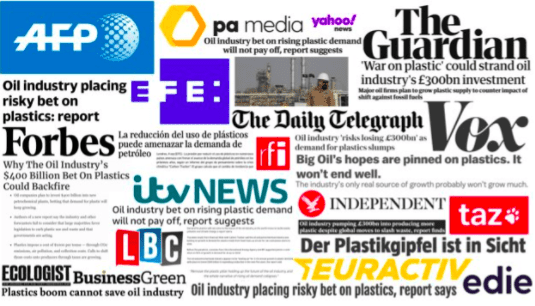Why plastics won’t save the oil industry

This September, Greenhouse collaborated with Carbon Tracker to launch “The Future’s Not In Plastics”. This new report reveals that the demand for virgin plastics may peak in 2027 and that the oil industry risks wasting $400bn over the next 5 years as demand for plastics falls and governments start taking climate action.
In this blog, we take a closer look at the report’s findings and the implications for the oil industry.
Key findings from the report
“It is simply delusional for the plastics industry to imagine that it can double its carbon emissions at the same time as the rest of the world is trying to cut them to zero,” said Kingsmill Bond, Carbon Tracker Energy Strategist and report lead author.
- Why plastic? With demand growth falling for things such as cars and planes, plastics make up all the expected growth in oil for petrochemicals, and are also the largest driver of expected oil demand.
- The oil industry’s plans: The industry is pinning its hopes for future growth on strong plastics demand that will not materialise, as the world starts to tackle plastic waste and governments act to hit climate targets. This risks $400 billion worth of stranded petrochemical investments, increasing the likelihood of peak oil demand.
- The impact of plastic: Plastic imposes large costs on society through air and ocean pollution, microplastics, and waste. Most specifically, carbon dioxide is produced at every stage of the plastic value chain. Not only in the extraction and manufacturing processes, but also at the end of life when it’s burnt, buried or recycled.

Carbon Tracker’s report finds that producing a tonne of plastic releases roughly twice as much CO2 as producing a tonne of oil.
But there are technological solutions…
Carbon Tracker also looks at SYSTEMIQ’s “Breaking the Plastic Wave” report which puts forward three solutions to deliver 2040 plastic utility at half the capital cost, half the plastic, and with 700,000 more jobs.
It calls for:
- Reduced plastics demand through better design and regulation. For example, by extending the lifetime of household goods, or creating new delivery models that are based on subscription services or refill from dispensers.
- Substitutes with other products such as compostables, paper, and coated paper. Ie: Replace plastic food punnets with paper ones and introduce paper-based foodservice items.
- Scaling up chemical and mechanical recycling. Expanding the recycling infrastructure size, forcing changes in design and improving the legislative environment.
“There are huge benefits in the change from the current linear system to a more circular one. You can have all the functionality of plastics but at half the capital cost, half the feedstock, 700,000 additional jobs and 80% less plastic pollution.”
… And political solutions too
Carbon Tracker focus on five areas where governments can act:
- Introduce taxes to make polluters pay for the externality cost of oil.
- Take the money raised from these taxes to build recycling systems and infrastructures fit for purpose.
- Regulate design by being clearer about what is allowed and what is not.
- Set targets for the share of recycled plastic that is used in products and for the share of all plastics that must be recycled and collected.
- Ban certain products, such as plastic straws or plastic cutlery or single-use plastic.

Campaign highlights
The Greenhouse team supported the launch of the report through international media outreach. We secured more than 300 pieces of coverage, including PA, AFP, EFE, The Guardian, The Daily Telegraph, and The Independent.
With the industry already facing huge overcapacity, it’s still planning to spend a further $400bn on new capacity and unless stopped, this will result in continued low prices and stranded assets. This report highlights the stark contrast between the plans of the petrochemical industry and the threat of much lower growth, but also shines a light on the political and technological solutions out there.
Policymakers in Europe and China are implementing much stricter regulations using the five key tools of taxation, design rules, bans, targets, and infrastructure. In this time, it is imperative government and investors show a clear plan to solve the plastic problem and help solve the climate crisis.
You can read the full report here
Greenhouse PR works with organisations and leaders who are pioneering climate action. Whether it’s food, fashion, finance or farming, if you’ve got a great story and need our help to tell it, get in touch with the Greenhouse team on 0117 214 1250 or email info@greenhousepr.co.uk.


